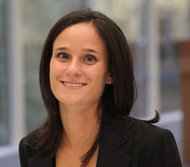She Owns It
Portraits of women entrepreneurs.
 Sara Krulwich/The New York TimesSusan Parker
Sara Krulwich/The New York TimesSusan Parker
Most family businesses don’t survive beyond the founder’s generation. Bari Jay, in its second generation, and Johnson Security Bureau, in its third, are two exceptions. Both companies are thriving largely because of the efforts of two of our business group members, Susan Parker and Jessica Johnson, respectively. Each woman stepped in after her father’s death, and remade aspects of the business, often taking steps that their fathers never would have considered — or endorsed. During our latest meeting of the group, Ms. Johnson and Ms. Parker talked about what their fathers might think if they were to see how things run today.
“My dad and I butted heads on how the business should run in the last months that he was alive,” said Ms. Johnson, who took over in 2009. Areas of disagreement included estimating and bidding on projects, using technology, leveraging relationships with existing clients and forging relationships with new ones. Typically, Ms. Johnson’s father would hear of a security contract becoming available through a connection. Knowing someone who was familiar with his work was enough for her father to get a foot in the door, said Ms. Johnson. After that, he just sold the client on price and then performed.
“He got very comfortable,” said Ms. Johnson, who has far fewer security industry contacts but an extensive sales background. She urged her father to take a more proactive approach. “Sometimes you’ve got to go out there and hustle,” she said. But Mr. Johnson had never really had to market the business. For that reason, and also because of a general reluctance to embrace technology, he was hesitant to set up a Web site, or even to get voice mail, Ms. Johnson said.
She also said she and her father had different expectations regarding employees. “My dad never really worked for anyone else,” said Ms. Johnson, who says she believes her years of having a boss helped her better understand employee needs. She noted that the employment relationship must serve both employer and employee. “I don’t think he was as focused on it being a good fit both ways,” she said.
“He had no point of reference,” said a group member, Alexandra Mayzler, who said she understood his position because she, too, had never had a boss. Ms. Mayzler said she often struggled to determine the best way to communicate with employees at Thinking Caps Tutoring. While she wants to be approachable, she can’t always stop what she’s doing to address concerns that might be as minor as a request to write a recommendation letter. To understand what it’s like to be an employee, Ms. Mayzler said she constantly turned to a friend who worked in “corporate America.”
Ms. Parker said that, because she and her sister had worked for other companies before they took over Bari Jay in 2008, they had expectations about how to handle the human relations aspect of the business. The sisters established an official H.R. policy and handbook, which Ms. Parker said was unusual for a small garment center business. She said that because they had both held other jobs, neither could imagine going without a handbook. “You can get sued,” she said. Additionally, the sisters set up a 401(k) plan that contributed matching funds. “These are things I had at my old job, so I knew about them and wanted them,” she said.
She added that, if her father were working with them today, he would “want nothing to do with this whole H.R. thing.” While he would be happy to let his daughters run with it, it’s unlikely he would have seen a need to establish anything formal.
Additionally, she said, he would have continued to delegate the tasks required to execute business with Bari Jay’s Chinese factories. Because he was resistant to change, the company was among the last of its competitors to go overseas, in 2004. Until then, Bari Jay’s factories were located in New York City, in Queens and in Chinatown. Ms. Parker said her father did visit the Chinese factories that Bari Jay used, serving as the personable face of the company.
“He was old-school garment center, and didn’t want to learn the new way of doing things,” she said. For example, he always paid by check. Dealing with payments to Chinese factories would have required him to learn how to go online to send a wire transfer.
Despite Bari Jay’s growth and success, Ms. Parker said, business would probably be even better today if her father, who had 40 years of garment center experience, were working with his daughters today. Ms. Parker has a wide network of informal advisers, including a competitor, some of her father’s old industry friends and his mentor, who is 83 and still working. “We have a lot of people to call, but I wouldn’t need all of them if my dad were here,” Ms. Parker said.
“Could you hire someone with that experience?” asked Ms. Mayzler.
“When we first took over, we looked into it, but a lot of the people we talked to walked in with huge egos and wanted huge salaries,” Ms. Parker said. Nothing seemed to warrant either, she said, so she and her sister decided to figure things out for themselves.
You can follow Adriana Gardella on Twitter.
Article source: http://feeds.nytimes.com/click.phdo?i=6881f278833f27d26769ced4bcf97c71
Speak Your Mind
You must be logged in to post a comment.